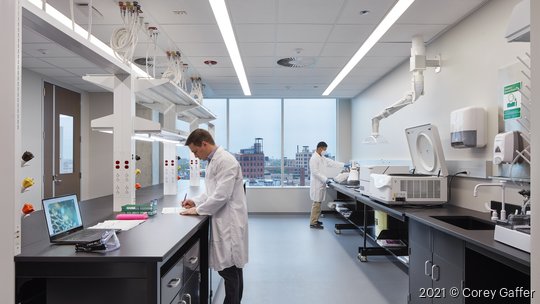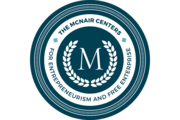
A nationwide trend in university investment and infrastructure development has led to previously under-the-radar life sciences markets becoming more attractive, according to the CEO of one venture capital firm slated to expand to Houston.
John Flavin, founder and CEO of Chicago-based Portal Innovations, founded the firm in 2020 to address a perceived need for the Windy City to leverage the potential of its biotechnology research. Flavin said he saw similar growth potential in Houston, where Portal plans to join the Texas Medical Center's Helix Park campus.
“We believe that by bringing the lab infrastructure and by letting our teams help move the needle, we can help elevate the life sciences ecosystem here,” Flavin told Houston Inno. “We’ve seen success in Chicago, we’ve seen early success in our recent move to Boston, and we believe we can see it here too.”
Other observations Flavin brought from Chicago include how Portal fits into a venture ecosystem that is beginning to recognize life sciences as an investment target. Prior to a market slowdown in 2022, venture funding for the life sciences hit its peak in 2021 with nearly $50 billion invested nationwide, according to commercial real estate firm Cushman & Wakefield.
“Early-stage capital becomes a requirement that's often lacking in early and emerging ecosystems,” Flavin said. "Certainly, we found that in Chicago, and we expect similar in Houston. And if all your capital is coming from external locations, you don’t have the type of stickiness of local capital that your company needs to get up and going [from an entrepreneur point of view].”
Flavin noted that while Portal could also be seen as the same type of external capital, he envisioned the company as coming from the same perspective as existing local firms. Portal also is expected to serve as a catalyst to draw more funding from other parts of the country to Houston, Flavin said.

The Texas Medical Center and its innovation arm, TMCi, were instrumental factors in bringing Portal to Houston specifically. Flavin highlighted the research of individuals such as Dr. James Allison as well as institutions such as Baylor College of Medicine as the type of pipelines he wanted to see Portal tap into.
“All of these institutions have attracted new innovators to their faculty that are eager to invent things that could be commercialized,” Flavin said. “When you talk about innovators like Jim Allison and his research, and you have that work scaling in Helix Park, not only will that impact the industry and patients, but it creates a sustainable ecosystem with more jobs and offices in Houston.”
The venture firm has already begun partnering with TMCi on joint programming, which Flavin described as a listening tour to help Portal’s team settle in Houston. While he could not share specifics, he said the company would begin hiring experience managers and other personnel who will help introduce Portal to potential entrepreneurs.
Portal will be located in the TMC3 Collaborative Building, part of Helix Park’s first phase, which is set to open later in 2023. TMC’s own headquarters will also be located in the building, and three member institutions — the University of Texas MD Anderson Cancer Center, Texas A&M University, and the University of Texas Health Science Center Houston — will share collaborative space. TMC officials confirmed to Houston Inno that the building was 80% leased.
Several organizations have recognized Houston’s growth in the life sciences sector. For instance, CBRE named the Bayou City as the top market in Texas for life sciences talent, though Houston’s No. 13 ranking out of 25 leaves it behind traditional powerhouses such as Boston and San Diego.
Several biotechnology companies have made moves to expand their manufacturing and laboratory space in Houston in the past 18 months. Lonza Group Ltd., a Switzerland-based contract development and manufacturing organization, completed a 15,000-square-foot lab space expansion in February, which will allow the company to host more clients manufacturing cell and gene therapies.
Meanwhile, CTMC, a joint venture between the University of Texas MD Anderson Cancer Center and San Francisco-based National Resilience Inc., completed its own 2,000-square-foot expansion in April. CTMC CEO Dr. Jason Bock previously said Houston’s central location and population size make the city an attractive candidate for clinical testing and contract manufacturing.





